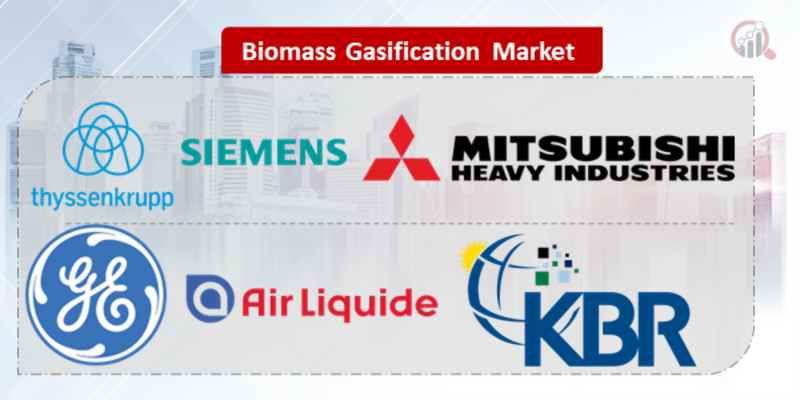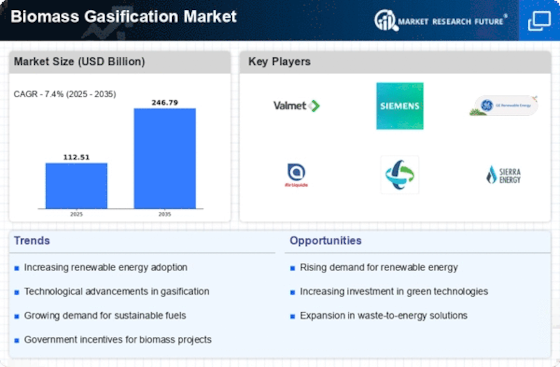Top Industry Leaders in the Biomass Gasification Market

*Disclaimer: List of key companies in no particular order
The global biomass gasification market is undergoing dynamic growth, fueled by increasing concerns about climate change and the escalating demand for renewable energy sources. In this vibrant landscape, a diverse array of participants, including established industry leaders, innovative startups, and government-backed initiatives, shape the competitive dynamics. As the market matures, companies are strategically positioning themselves to secure market share and thrive in this evolving environment.
Key Player Strategies: Prominent players in the biomass gasification market include Synthesis Energy Systems Inc., Royal Dutch Shell Plc, Cb&l, General Electric, Kbrinc, and Air Liquide. The competitive landscape is categorized by the following strategies:
Market Leaders: Established giants like Siemens, Air Liquide, KBR, and Mitsubishi Heavy Industries maintain market leadership through extensive experience, global reach, and a comprehensive portfolio of gasification technologies. Continuous research and development, strategic partnerships, and robust marketing campaigns are key components of their strategy.
Technology Innovators: Nimble companies such as Enerkem, Velocys, and TCG Green drive innovation by developing next-generation gasification technologies with enhanced efficiency, cost-effectiveness, and feedstock flexibility. Collaboration with established players is common to access capital and scale operations.
Regional Focus: Companies like Entech and Best Energy target specific geographic regions to capitalize on unique market dynamics and regulatory frameworks. Examples include active targeting of the rapidly growing Chinese market by some companies and a focus on the European market by Scandinavian Biogas and Cortus Energy.
Vertical Integration: Some companies pursue vertical integration, expanding beyond core gasification technology to develop expertise in areas such as feedstock supply, plant construction, and project financing. This enables them to offer turnkey solutions to customers.
Market Share Analysis: Several factors contribute to a company's market share in the biomass gasification market:
Technology Portfolio: The breadth and depth of a company's gasification technology portfolio significantly impact its market share, encompassing different feedstock types and gasification processes.
Project Execution Capabilities: Companies with a proven track record of successfully executing complex gasification projects, meeting deadlines and budgets, gain trust and attract new customers.
Global Reach: Companies with a strong international presence and established regional networks are better positioned to capture opportunities in emerging markets.
Financial Strength: Access to capital plays a crucial role in funding research and development, expanding operations, and acquiring new technologies, ultimately impacting market share.
Government Support: Active participation in government-funded initiatives and receiving grants for research or project development provides a competitive advantage.
New and Emerging Trends: Several trends are shaping the competitive landscape of the biomass gasification market:
Decentralized Solutions: The rise of small-scale, modular gasification systems addressing local energy needs is attracting smaller companies and startups.
Biomass Feedstock Diversification: Companies explore non-traditional biomass feedstocks like algae, municipal solid waste, and agricultural residues to broaden their customer base.
Circular Economy Integration: Biomass gasification is integrated into circular economy models, utilizing waste streams from various industries as feedstock, promoting sustainability.
Digitalization and Automation: Advanced digital technologies like AI and machine learning are integrated to optimize plant operations, improve efficiency, and reduce costs.
Focus on Carbon Capture and Storage: Companies explore integrating carbon capture and storage technologies with gasification processes to further reduce their environmental footprint.
Overall Competitive Scenario: The biomass gasification market witnesses heightened competition due to increasing awareness, expanding applications, and supportive government policies. This competition drives innovation, cost reductions, and improved efficiency, benefiting end-users. Mergers and acquisitions are anticipated as companies seek to expand their technology offerings, geographic reach, and market share. Collaboration becomes essential for addressing technical challenges, developing innovative solutions, and sharing best practices. Companies that adapt to evolving trends, offer competitive pricing, and demonstrate strong execution capabilities are poised to thrive in this competitive landscape.
Industry Developments and Latest Updates: Recent developments in the biomass gasification market include partnerships, joint ventures, and contract wins by key players:
Synthesis Energy Systems Inc. (SES):
October 26, 2023: Announced a partnership with Enviva Pellets Arkansas, LLC to explore the feasibility of a renewable methanol plant in Arkansas using SES gasification technology.
Royal Dutch Shell Plc (Shell):
November 16, 2023: Launched a joint venture with QCP Renewables to develop a bio-syngas project in Canada, utilizing forest biomass waste.
Chicago Bridge & Iron Company N.V. (CBL):
November 9, 2023: Secured a contract with Enerkem Alberta to design and build a waste-to-syngas facility in Canada.
General Electric (GE):
December 5, 2023: Showcased its biomass gasification technology at the POWERGEN Asia exhibition in Thailand.
These developments showcase the dynamic nature of the biomass gasification market and the strategic moves made by key players to stay ahead in this competitive landscape.










